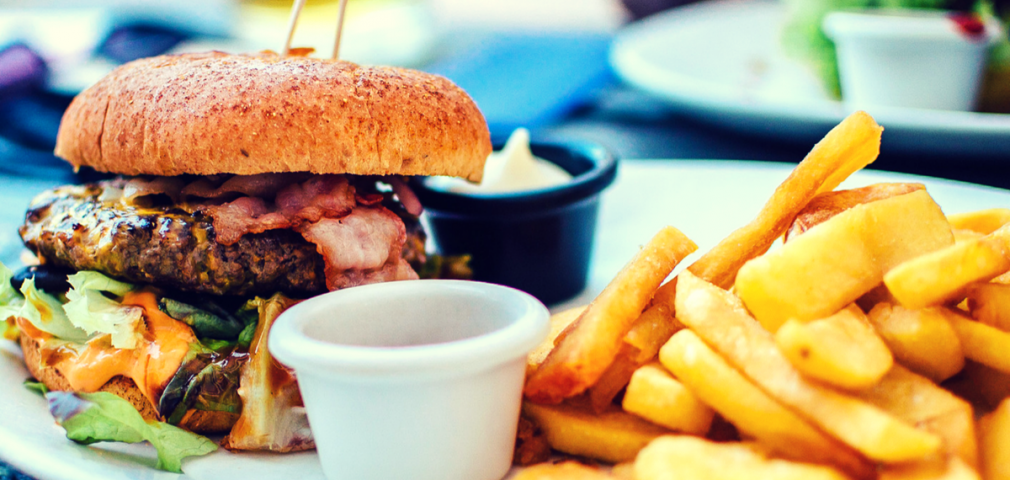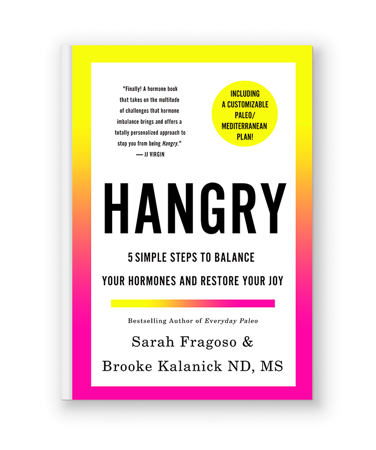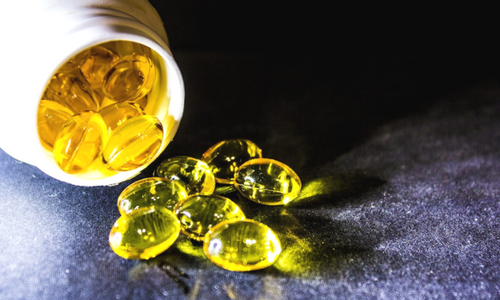
While managing carbs gets most of the attention when it comes to PCOS, fat and protein deserve their fair share of attention too. I promise to dedicate an entire post to protein soon but this one is all about fat: how much, what kind and what weird stuff to look out for.
If you’ve got PCOS you’ve already found that much of the general nutrition advice (i.e. just stop sugar or eat only whole grains) falls flat or may help balance one hormone but seems to exacerbate your other hormonal issues (i.e. estrogen-progesterone balance, low thyroid, adrenal issues, etc.).
This is because PCOS is such a complex mix of hormonal, food and environmental interactions and it’s easy for two things to happen:
1. A nutrition strategy appeases one hormone but exacerbates another.
For example, you’ve gone lower carb and higher animal protein and fat. This probably makes your insulin system very happy but as you’ll see in this post, that can perturb your estrogen and progesterone issues.
2. It’s never just one thing or one hormone when you’ve got PCOS – or are a woman in general!
You’ve tuned up your carbs and you’re eating more veggies but still frustrated with your progress, what gives?
Remember that it’s so common to have several things be just a little off but when they are added together it can be a bigger deal. Multiple smaller issues can add up and make your overall metabolism more imbalanced – even if labs look “pretty normal” or things seem overall not so out of whack.
So while hormones in animal fat (we’ll get to that in a minute) may not be a big dig for your girlfriend and maybe wouldn’t be that big a deal for you if you didn’t also have insulin resistance, estrogen dominance, some adrenal stress, low B12 and a borderline thyroid. Taken together, you’ve now got a pretty big burden on your metabolism, enough to tip the scales for you and make things a lot harder. It means all these little things matter for you.
I know, it’s frustrating. It’s not simple, yet you’re repeatedly offered simple solutions. I hope to remedy that here on this blog, with the new podcast and you’re following me on Facebook and IG as well. right? Good 🙂
Get you FREE copy of my Guide To Lab Testing & Your Hormones
This guide covers hormonal testing and thyroid patterns and will show you how to suss out the Hormonal Dealbreakers of inflammation, anemia and blood sugar problems.
Get Your Free Lab Guide HereA few thing to know about dietary fat if you’ve got PCOS or other hormonal issues:
Hormone Mash Up
When you have insulin resistance (as with PCOS or for other reasons), some minute hormonal interactions become magnified. I cover this in more detail in this blog but quickly these other hormones are LPL (lipoprotein lipase), HSL (hormone sensitive lipase), CPT1 and ASP (acetylation stimulating peptide). The quick chemistry lesson is that as your body constantly is trying to burn fuel or store fuel, your hormonal balance will determine if you’re in a fat storing or fat burning place.
And you guessed it: you tend to lean towards fat storing when you have insulin resistance. You lean even more that way when you eat carbs and fat together because the breakdown of fat (via HSL and CPT1) are slowed and the storage of fat (via LPL and ASP) are spurred with this combo, especially if you have insulin resistance. These lesser discussed hormones make the fat + carb combo (especially saturated fat + carbs) more of an issue for increased fat storage, so women with PCOS are wise to side step frequent high starch and high fat (particularly saturated fat) meals.
Of course you’ll have some pizza, guac and chips, French fries or even a “healthier” carb+fat combo like sweet potato and a generous serving of butter on occasion. Just watch if this combo is a part of your daily diet or happens frequently as it may be a variable you can adjust to get better results.
Again, I cover the nuances of these hormones in this post.
The take away here is if your meal has a lot of carbs, have less fat OR if your meal is low carb, feel free to add some fat.
My general PCOS diet template is this: breakfast and lunch are a veggie+protein meal that is low carb and higher fat (either via a fattier protein like grass fed beef or salmon OR adding nuts, olives, coconut, avocado, etc.) and dinner is a veggie+protein meal that is lower in fat (leaner proteins like chicken, turkey, fish or lean pork) and contains a serving of high fiber starch or fruit (i.e. apple, sweet potato, squashes, or a high fiber grain that you’re not sensitive to).
POPS & Other Gunk
POPS (persistence organic pollutants, aka plastic and pesticide residues) and hormones in our animal products can be a bigger problem for women with PCOS as the delicate female hormone system is already off kilter. Hormones and POPS are fat soluble so whatever the animal was exposed to in their water supply, diet or in their care (i.e. if the animal was given hormones or antibiotics) they will have more of an estrogenic effect in us than someone with a normal hormone balance.
And keep in mind, grass fed or organic or otherwise more healthfully raised animals still have a metabolism, they still will have some estrogen in their body fat and likely some POPS due to our modern environment and water supply, it’s simply hard to escape this entirely – even for blissful, pasture raised cattle.
As I mentioned above, this additional hormone burden may not affect every woman to any noticeable degree but if you are already have an estrogen-progesterone imbalance such as with PCOS or during menopause, you can suffer more consequences. So lean more towards less conventionally raise meats as often as possible and be sure your diet includes more leaner proteins than fattier proteins overall.
Order Hangry and get some AMAZING bonuses right now!
If you’ve ever felt like a Hangry B*tch and are ready to balance your hormones and restore your joy in just 5 simple steps then Hangry is for you!
GET YOUR BONUSES NOW
Committed to eating cleaner animal fats?
Great. I consistently see improvements with PCOS when women keep a closer eye on this as I do recommend a high protein diet for PCOS.
But….what about in restaurants? Should you be afraid to eat outside your home? Like I said, you can’t escape this entirely. Do better when you can, minimize conventionally raised animal fat at home as often as you can, eat leaner proteins more often than not, and don’t sweat the occasional burger or steak in a restaurant.
Do as much as you can as often as you can. But don’t totally ignore it either. Just because you can’t avoid it 100% doesn’t mean we should just feel defeated and say, “Well I can’t be perfect so why bother even trying”.
Remember this Dr Brookeism: if you can’t do everything, don’t do nothing, at least do something.
You May Have Delta 6 Desaturase Deficiency Or Inefficiency
Although it sounds like it, it’s not a sorority. You’re not pledging Delta6, but rather your metabolism lacks it – at least it might.
It is common for those with insulin resistance to have low activity of this enzyme and possibly others in the omega 3 fatty acid pathway (i.e. elongase). We’ve been hearing the benefits of a high omega 3 to omega 6 ratio for years as balance here means less inflammation, better hormonal balance and less problems with chronic disease – not to mention a clear thinking brain, pretty skin and better fat loss.
What sluggishness with delta 6 desaturase means for your metabolism is that you can’t take omega 3 forms such as alpha linolenic acid (found in flax oil, grains and green veggies) into EPA (eicosapentaenoic acid) and DHA (docosahexaenoic acid) which are what you actually need. This means when it comes to supplements and omega oils, skip the flax oil.
While it is touted as a good source of omega 3s it is predominantly alpha linolenic acid thus it renders useless for you because you can’t take it into those EPA and DHA forms you’re after for all the omega 3 benefit. Not to mention flax oil goes rancid very, very easily so it is not a great quality oil in liquid form for anyone.
The goal of upping your omega3s: you’re trying to get to EPA and DHA – they are the beneficial, simplistically thought of as anti-inflammatory fatty acids. These are the ones that will help improve insulin sensitivity and balance out an inflamed system.
If you have insulin resistance you likely can’t turn that alpha- linolenic acid (ALA) into EPA and DHA because you lack the enzyme to convert ALA into these other forms.
So skip the flax oil and supplement with fish oil which contains the preformed EPA and DHA. Flax seeds on the other hand can be a great support to a PCOS girl as the lignans in flax seeds will help scoot out estrogen and other hormone metabolites via the digestive tract which can improve overall hormone balance and lessen estrogen dominance. The best way to utilize flaxseeds is fresh ground or make a snot-like slurry (gross but effective) by soaking 1 tbsp. of flax overnight in 2tbsp of water (enough to cover the seeds) and then shoot it down or add to a protein shake in the morning.
How about managing the ALA you get from food (i.e. veggies)? You can improve your delta 6 desaturase activity by ensuring that you’re getting enough protein, zinc, vitamin E, vitamin B12 and vitamin B6 (note: zinc, B12 and B6 are common deficiencies with PCOS as well as from taking metformin and birth control pills or other hormones).
Skip Crap Fats
One reason a junk food diet or consuming a lot of man-made fats such as margarine, shortening or hydrogenated oils is unhealthy and inflammatory is that they inhibit delta six desaturase activity as well.
This is one way that clearing out the packaged junk food can really help you get a leg up on hormonal balance. This obviously goes well beyond calories right? Packaged foods can easily be high cal but they are often high in both carbs + fat which you now know can be an issue for you with insulin resistance and they are often full of these hydrogenated fats which so easily worsen inflammation – especially in an already unbalanced hormonal system.
Are you gonna need a food that comes in a box or wrapper sometimes? Of course.
Thankfully these days there are healthier options and I think, I really think, we’re passed the days of thinking margarine or “I can’t believe they call this food” sprays are healthier choices. But again, what about when you’re not cooking at home in higher quality animal fats? You can bet most restaurants are using hydrogenated vegetable oil to prepare your food. Why? It’s cheap.
The best way to sidestep this one is to ask them to prepare your meal in butter (if you tolerate dairy). Most restaurants have butter around and it’s a pretty easy swap. And since all of this is becoming more mainstream and less hippy-dippy, you may even be able to ask for your food to be prepared with coconut oil.
Order Hangry and get some AMAZING bonuses right now!
If you’ve ever felt like a Hangry B*tch and are ready to balance your hormones and restore your joy in just 5 simple steps then Hangry is for you!
GET YOUR BONUSES NOW
Again, do what you can as often as you can – every little bit counts. So there’s the skinny on some lesser talked about issues with fat when it comes to PCOS, insulin resistance, fat loss and hormone balance.
And take note: anything that skews the inflammatory pathway will complicate issues if you have autoimmunity such as Hashimoto’s so my thyroid girls take note as well.
B6 is also found chiefly in animal foods. It is highly sensitive to heat. Best sources are raw dairy products, raw fish and raw meat. Zinc absorption is inhibited by phytic acid in whole grains and legumes, particularly soy, that have not been properly prepared. Best sources of zinc are animal foods—red meat, organ meats and some sea foods such as oysters.
Alcohol consumption interferes with D6D, as does malnutrition and overeating—so moderation is the key to tripping lightly down the prostaglandin pathway. Again, this isn’t a huge issue for every woman, but if your hormones are wonky, issues like this can tip the scales further out of balance and your health and metabolism may fare better if you’re mindful here.
And remember this: it may not just be one thing like POPS or non-grass fed beef getting in the way of you feeling better or making more progress in the gym.
But if you add this with several other metabolic stressors (i.e. Hashimoto’s or a food intolerance or adrenal fatigue) together it can easily add up to more metabolic stress making it harder to maintain your health and ideal physique. We get into trouble when we dogmatically take a stand on issues like this as good or bad, hope or hype, black or white, which is something I see all over fitness and health blogs.
Truth is that things like this or say, gluten for example, may be no biggie for most people but they are a very big problem for some (I’m talking beyond those with Celiac). Or it may be a minor issue but you also have four other minor issues compounding into a bigger challenge.
Keep in mind, if you have a hormonal issue like PCOS, or Hashimoto’s or are going through menopause general advice falls very short for you and these complex hormonal, food and environmental interactions are in part why.


